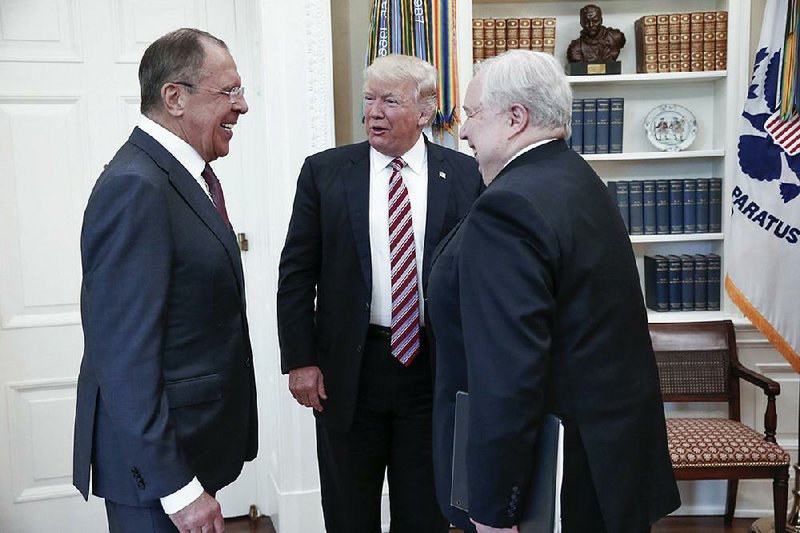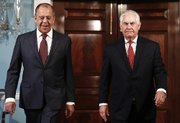WASHINGTON -- President Donald Trump on Wednesday welcomed Vladimir Putin's top diplomat to the White House for Trump's highest level face-to-face contact with a Russian government official since he took office in January.
RELATED ARTICLES
http://www.arkansas…">Griffin: Quizzed over Turk exile, charter schools http://www.arkansas…">Flynn's work abroad raises more questions
Trump and Foreign Minister Sergey Lavrov met in private, though both sides cast the session as a sign of ties having improved since the U.S. leader's assessment of them last month as at an "all-time low." On Wednesday, they focused on areas of budding agreement.
"We had a very, very good meeting with Mr. Lavrov, and I thought it was very good," Trump said. In a later statement, the White House said Trump "further emphasized his desire to build a better relationship between the United States and Russia."
Lavrov sought to blame the recent acrimony on former President Barack Obama.
[PRESIDENT TRUMP: Timeline, appointments, executive orders + guide to actions in first 100 days]
"The previous administration bent over backwards to undermine the solid foundation of our relations," Lavrov told reporters at the Russian Embassy after meeting Trump. "We have to start at a very low level."
In contrast, he credited Trump and Secretary of State Rex Tillerson, whom he met earlier in the day, with taking a "businesslike" approach that is "free from ideology," focused on reaching agreements. None was apparently reached Wednesday.
Lavrov added: "The Trump administration, and the president himself and the secretary of state -- and I got confirmation of that once again today -- are business people, and they want to make a deal."
The last time Lavrov visited the U.S. capital was before Russia annexed Crimea from Ukraine and intervened militarily in Syria to help President Bashar Assad -- actions that fueled U.S.-Russia tensions.
Before meeting with Tillerson, the Russian diplomat refused to weigh in on Trump's decision to fire James Comey, the former FBI director, who had been overseeing investigations of alleged Russian interference in the U.S. election and possible collusion by Trump's campaign. Lavrov called it a U.S. decision, echoing Putin, who said Russia had nothing to do with Comey's dismissal.
"Was he fired? You're kidding," Lavrov said sarcastically, feigning surprise as he started his day of meetings in Washington.
Addressing reporters later in the day, after his Oval Office meeting with Trump, Lavrov showed his irritation over repeated questions about Russia's alleged interference in the presidential elections.
"I never thought I'd have to answer such questions, particularly in the United States given your highly developed democratic system," he said, according to a simultaneous translation of his remarks into English.
Lavrov said the allegations didn't arise during his meeting with Trump. "Neither of us brought up this bacchanalia," Lavrov said.
The White House barred the news media from the private meeting. But Lavrov's delegation got Tass, a Russian news agency, in to take photos. One of the photos showed Trump shaking hands with Sergei Kislyak, the Russian ambassador who is a key figure in the FBI's Russia investigation.
Russia's Foreign Ministry tweeted the photos.
Trump, speaking to reporters after his meeting with Lavrov, didn't mention Kislyak, and neither did the White House statement. Trump fired his first national security adviser, Michael Flynn, for misleading Vice President Mike Pence about the extent of conversations he had with the Russian ambassador before Trump's inauguration. The conversations were intercepted by U.S. intelligence agencies.
Two U.S. officials have said Flynn is one of the subjects of investigations into contacts between Trump's advisers and the Russian government during and after last year's election.
Lavrov chalked up the controversy to "noise" and to "false news" -- invoking Trump's frequent references to the Russia allegations as "fake news."
Syria, Ukraine Topics
On Syria, where Russia has backed Assad's forces and the U.S. has supported anti-Assad rebels, the talks appeared to indicate a slight narrowing of differences.
Russia, Turkey and Iran last week agreed on a plan for four "de-escalation zones" in the Arab country to quell a civil war that has killed some 400,000 people and contributed to global refugee and terror crises since breaking out in 2011. The U.S. isn't party to the deal and has reacted cautiously, especially given its misgivings about Iran's role.
But Lavrov said he detected a U.S. willingness to participate, especially with a zone being formed in Syria's south, near the border with Israel and Jordan.
"We believe the U.S. is really interested in that," Lavrov said, acknowledging details of the plan still needed to be worked out. The zones would not cover areas where the U.S.-led coalition is fighting the Islamic State group, but enforcement and other questions remain unanswered.
Russia has taken the lead in proposing the establishment of safe zones in parts of Syria, as a step toward ending the six-year civil war there. The U.S. objects to Russian backing for Assad and has supported some rebels fighting to oust him. But the two countries, the most powerful of the many external actors that have been drawn into the Syrian war, agree on the goal of defeating the Islamic State extremist group.
"What we want to do is we want to see the killing, the horrible killing in Syria, stop as soon as possible and everybody's working toward that end," Trump said in his conversation with reporters in the Oval Office.
In his earlier meeting with Lavrov, Tillerson emphasized the U.S. wouldn't lift sanctions on Russia related to Ukraine until Russia reverses the actions that triggered the punishment -- namely, its Crimea annexation.
Russia wants the elimination of those and election-related sanctions imposed by Obama. Nevertheless, Lavrov struck a conciliatory tone and said Russia isn't intending to retaliate.
"Putin doesn't want to follow the lead of those who are trying to poison our relations to the point of no return," he said.
Lavrov also said that Putin and Trump, who haven't yet met in person, will see each other in July. Both are scheduled to travel to Germany for a Group of 20 leaders' meeting.
Information for this article was contributed by Josh Lederman, Vivian Salama, Julie Pace and Vladimir Isachenkov of The Associated Press; by Margaret Talev, Stepan Kravchenko, Nick Wadhams, Katia Dmitrieva, Laura Curtis and Jennifer Epstein of Bloomberg News; and by Carol Morello of The Washington Post.
A Section on 05/11/2017

